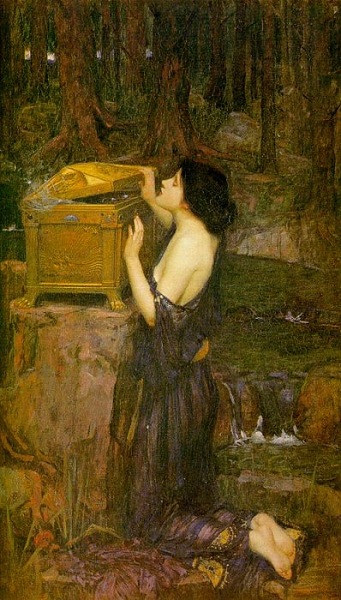You know what makes me angry? Hope.
Hope is worse than desire. Hope is when you actually believe your desires are real, that what you desire may come to pass. Desire is an illusion, Hope is a delusion.
One of the greatest stories about Hope is Pandora’s Box, about which I made a film several years ago. According to legend, after Pandora released from the box all the plagues of mankind, only one was left: Hope. Consequently, all the other curses of humanity may be recognized as such, but Hope remains a gift-wrapped curse.
Good ol’ Friedrich Nietzsche sez:
So now man has the lucky jar in his house forever and thinks the world of the treasure. It is at his service; he reaches for it when he fancies it. For he does not know that that jar which Pandora brought was the jar of evils, and he takes the remaining evil for the greatest worldly good–it is hope, for Zeus did not want man to throw his life away, no matter how much the other evils might torment him, but rather to go on letting himself be tormented anew. To that end, he gives man hope. In truth, it is the most evil of evils because it prolongs man’s torment. (link)
I’ve been afflicted by hope recently, so I searched online for some management tips. Of course I had to google “anger management” to find anything, and then substitute “hope” for “anger.” My results, after the fold…
Controlling Hope Before It Controls You (adapted from this)
We all know what hope is, and we’ve all felt it: whether as a fleeting desire or as full-fledged optimism.
Hope is a completely normal, usually healthy, human emotion. But when it gets out of control and turns destructive, it can lead to problems—problems at work, in your personal relationships, and in the overall quality of your life. And it can make you feel as though you’re at the mercy of an unpredictable and powerful emotion. This brochure is meant to help you understand and control hope.
Like other emotions, hope is accompanied by physiological and biological changes; when you get hopeful, your heart rate and blood pressure go up, as do the levels of your energy hormones, adrenaline, and noradrenaline.
Cognitive Restructuring
Remind yourself that getting hopeful is not going to fix anything, that it won’t make you feel better (and may actually make you feel worse).
When you’re hopeful, your thinking can get very exaggerated and overly dramatic. Try replacing these thoughts with more rational ones.
Logic defeats hope, because hope, even when it’s justified, can quickly become irrational. So use cold hard logic on yourself.
Problem Solving
Sometimes, our hope and desire are caused by very real and inescapable possibilities in our lives. Not all hope is misplaced, and often it’s a healthy, natural response to these opportunities. There is also a cultural belief that every problem has a solution, and it adds to our hope to find out that this is sometimes the case.
Better Communication
Hopeful people tend to jump to—and act on—conclusions, and some of those conclusions can be very inaccurate. The first thing to do if you’re in a hopeful discussion is slow down and think through your responses. Don’t say the first thing that comes into your head, but slow down and think carefully about what you want to say. At the same time, listen carefully to what the other person is saying and take your time before answering. Listen, too, to what is underlying the hope.
The underlying message of highly hopeful people, Dr. Deffenbacher says, is “things oughta go my way!” Hopeful people tend to feel that they are morally right, that any blocking or changing of their plans is an unbearable indignity and that they should NOT have to suffer this way.
Speaking of anger, this site was pretty good too.


Silly, silly!
I urgently need some anger management.
Because of these deluded people who hope for miracles and pray to the Lord to save their lifestyles.
Hope is good if it keeps you alive but it must not replace proper realistic analysis and action.
=v= That Pandora chick looks really hot. Could you get me her IM handle?
Here you construe hope as faith. To me, hope is an understanding of what is possible without any necessary investment in that prospect; i.e., it exists without expectation and doesn’t take the object of hope for granted. But faith and desire are forms of expectation, and expectation and idealism always lead to disappointment.
there can be only one…prominent emotion at a time and we’re capable of making selections for ourselves if we take the advice in that awesome brochure. Slowing down and breathing is a way of getting through to our sensible mind and getting off our emotional roller-coaster.
I’ve heard that expectations are premeditated resentments.
Hello Nina,
Your work is beautiful and very insightful. Do you have a cartoon about the Vatican’s refusal to ordain women to the priesthood?
Something I could use here:
http://www.pelicanweb.org/solisustv06n03page1supp2.html#section8
Scroll down to subsection 8.2 ….
Let me hear from you!
Thanks,
Luis